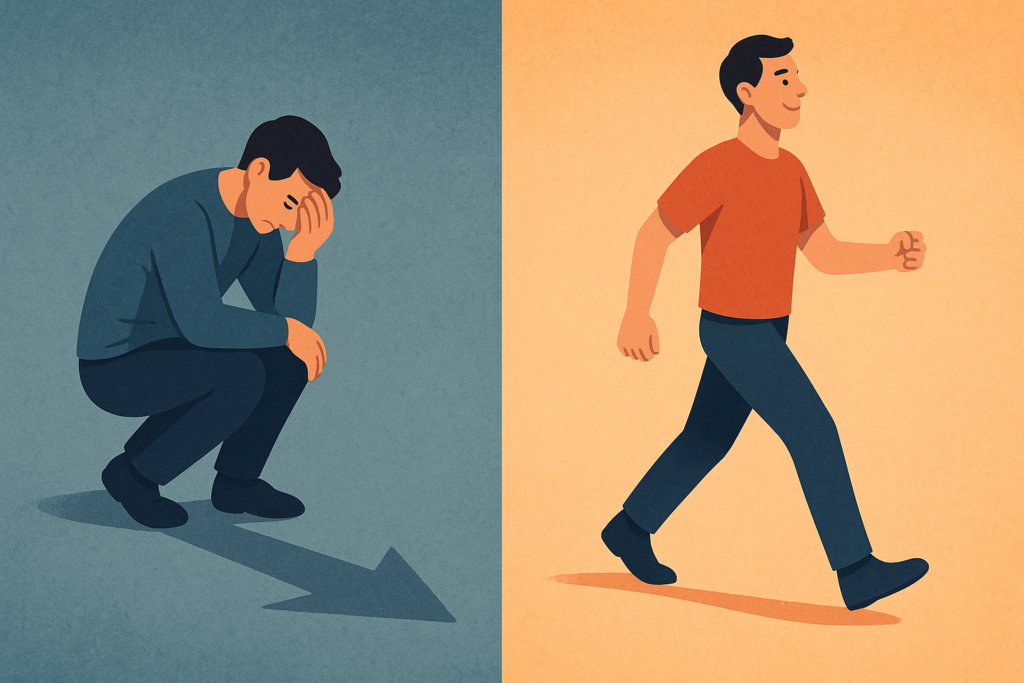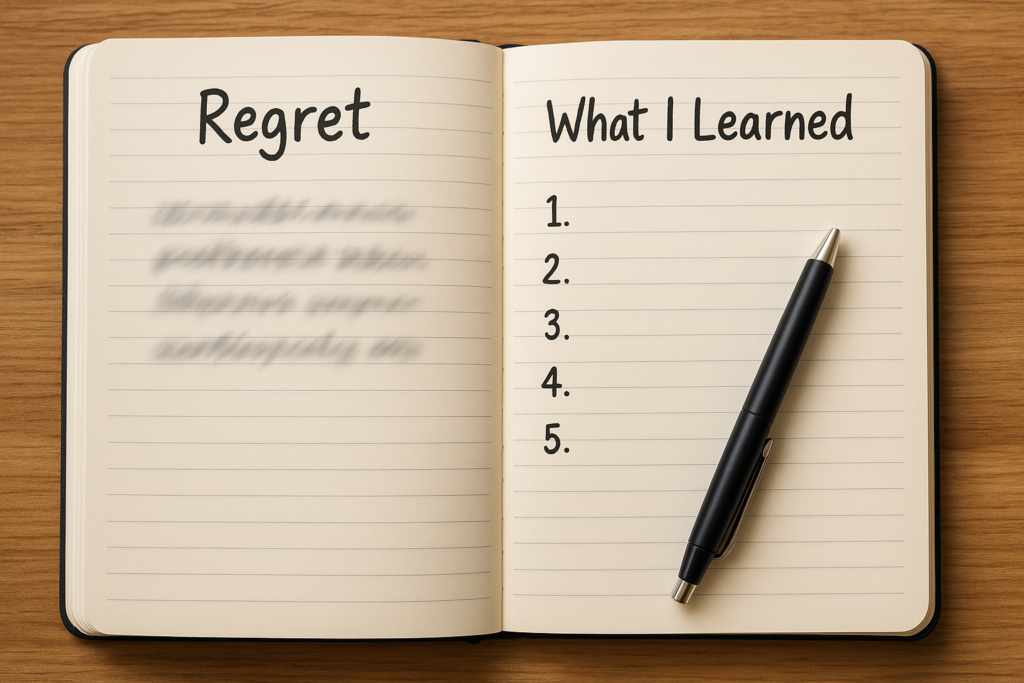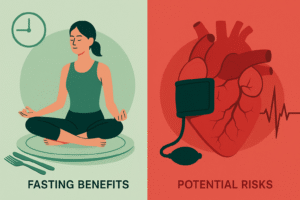Fun fact: Neuroscientists have found that the brain processes regret in the same regions it uses for decision-making—meaning regret isn’t just about the past, it’s also training for the future.
We’ve all been there. The job we didn’t take. The love we let slip away. The harsh words we wish we hadn’t said. Regret often shows up in the middle of the night, whispering “What if?” and “Why didn’t I?” It’s uncomfortable, even painful. But what if that sinking feeling wasn’t a mental pothole—but a signpost?
Welcome to the science of regret—a field that not only validates your feelings but also reveals how regret is a vital part of being human. Even more, it shows that regret isn’t just a ghost from the past—it’s fuel for transformation.
Regret Is Universal—and That’s a Good Thing
According to a 2022 study by Dr. Daniel H. Pink, author of The Power of Regret, 82% of people report feeling regret “occasionally or often.” That makes it one of the most common human emotions, right up there with love, joy, and anxiety.
In neuroscience, regret isn’t merely sadness. It’s a complex cognitive emotion that involves comparing our actual outcome with a hypothetical better outcome. The brain regions involved include the orbitofrontal cortex (OFC)—linked to evaluating outcomes—and the anterior cingulate cortex (ACC), which deals with decision conflict.
Translation: Regret is your brain doing a post-game analysis. It reviews what went wrong, so you can do better next time. It’s evolution’s way of teaching us how not to get eaten—or, in modern terms, how not to screw up the job interview, relationship, or financial decision.
Four Core Types of Regret (And Why They Matter)
Dr. Pink’s global survey of over 15,000 people revealed four core regret categories:
- Foundation Regrets – “If only I had taken better care of myself.” These are about poor choices in health, finances, or education.
- Boldness Regrets – “If only I had taken that risk.” Missed opportunities, career leaps not taken, adventures declined.
- Moral Regrets – “If only I had done the right thing.” These sting the longest—cheating, lying, or betraying someone’s trust.
- Connection Regrets – “If only I had reached out.” Lost relationships due to silence, pride, or neglect.
What unites these regrets? A sense of lost potential. And that’s where the growth lies. Regret highlights what we value. If you regret not calling your mom, it’s because you care about your relationship. That’s your internal compass talking.

Regret Helps Us Make Better Decisions
Studies from the Massachusetts Institute of Technology (MIT) show that when people experience regret, they are more likely to adapt their future behavior. In an experiment, participants who regretted a financial loss made smarter choices the next time.
This ties into neuroplasticity—the brain’s ability to rewire itself based on experience. Regret strengthens the connections in the brain related to self-control and long-term thinking. You literally become wiser, thanks to your emotional bruises.
This is why people who reflect on regret often end up making more values-aligned decisions. You regret spending too much time at work and missing your child’s recital? That regret might push you to reprioritize. It’s not a failure. It’s a feedback system.
Regret vs. Rumination: Know the Difference
But here’s the catch. Not all regret is helpful.
When regret becomes chronic rumination—replaying the same scene over and over—it loses its function. Rumination activates the default mode network (DMN) in the brain, which is linked to depressive thinking. That’s when regret turns toxic.
Psychologist Dr. Susan Nolen-Hoeksema warned that excessive rumination increases the risk of anxiety and depression. The key, she argued, is active reflection. This means asking:
- What did I learn?
- What would I do differently next time?
- What does this regret tell me about my values?
So instead of “Why did I do that?” ask “What does this teach me?”
The Healing Power of Regret
Believe it or not, sharing your regrets is a powerful way to heal. In fact, Dr. Pink’s research found that when people wrote about their regrets anonymously on his “World Regret Survey,” they felt lighter, more connected, and even more hopeful.
Why?
Because regret is a social emotion, it reminds us that we’re human, that we care, and that we long for a life well-lived.
In therapy, this is called reframing—a technique used in Cognitive Behavioral Therapy (CBT). You reinterpret a painful experience to uncover the lesson, the growth, the unexpected silver lining.

From Pain to Purpose: Stories of Regret-Driven Change
Take the story of Howard Schultz, former CEO of Starbucks Corporation (an American multinational coffeehouse chain). He once regretted ignoring his father’s struggles with poverty and job insecurity. That regret inspired him to create Starbucks’ employee benefits program, including health coverage for part-time workers.
Or Malala Yousafzai, who expressed regret over not speaking up earlier against Taliban suppression. That regret turned into global activism, education funding, and a Nobel Peace Prize.
In both cases, regret wasn’t the end. It was the beginning of a more meaningful chapter.
Can We Regret-Proof Our Lives?
Short answer: no. But we can live with fewer avoidable regrets.
Here’s how:
- Act boldly when your heart nudges you. Most regrets come not from action but from inaction.
- Stay aligned with your values. Regret often signals when we’ve gone against our moral compass.
- Connect more. Don’t let awkwardness or pride rob you of meaningful relationships.
- Forgive yourself. You’re not the person who made that mistake—you’re the person who learned from it.
Conclusion: Regret Is a Gift (Wrapped in Sandpaper)
Regret isn’t pleasant—but it’s powerful. It’s not a flaw in the human experience. It is the human experience.
It teaches us, humbles us, and guides us. It shines a spotlight on what matters. And it gives us the rare opportunity to course-correct while we still have time.
So the next time regret shows up—don’t shove it away. Invite it in. Ask it what it wants to teach you. And then thank it for helping you grow.
Author’s Note:
Regret is something we all carry, but we rarely talk about it openly. I hope this blog helped you see that your regrets are not weaknesses, but mirrors showing you who you truly want to be. Growth isn’t clean or easy—it’s messy, emotional, and deeply human. And that’s what makes it meaningful.
G.C., Ecosociosphere contributor.
References and Further Reading:
- The Power of Regret by Daniel H. Pink
- Neuroscience of Regret – MIT Research
- American Psychological Association on Rumination
- Margaret Heffernan – Embracing Uncertainty. https://mheffernan.com/book-embracinguncertainty.php




